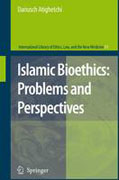
This book presents a critical analysis of the debate at the religious, legal and political level sparked off by the introduction of new biomedical technologies (cloning, genetics, organ transplants, IVF, etc.) in Muslim countries. Itcompares the positions of "classic" Muslim law and contemporary religious authorities; laws in Muslim countries; the attitudes and concrete behaviour of populations, families and individuals, as well as the regulations of medical associations, bioethics committees etc... The result is a mosaic of positions which are often different (including from the point of view of ethics) but all in pursuit of legitimisation according to the Koran and the Shari'a. The work has an interdisciplinary approach, drawing on law, sociology, anthropology, politics and the history of science. For this reason it will be of interest to scholars and operators in a wide variety of disciplines and fields. INDICE: 1. Introduction to muslim law. 1.1 The origins. 1.2 The present. 1.3 Conclusion. 2. Features of islamic bioethics. 2.1 The value of the different positions. 2.2 The problems of ethical pluralism. 2.3 Algeria, Tunisia, Pakistan and Iran. 2.4 The dependence on muslim law. 2.5 The political dimension of islamic bioethics. 2.6 The principles of bioethics. 2.7 Cultural sensibilities and medical ethics. 2.8 Bioethics and society. 2.9 Bioethics and apologetics. 2.10 Bioethics and muslim countries. 2.11 Conclusion. 3. Aspects of islamicmedical ethics. 3.1 Introduction. 3.2 Principles and characteristics. 3.3 Thedoctor-patient relationship. 3.4 Men and women. 3.5 Autonomy and consent of the patient. 3.6 Saudi Arabia, Libya, Tunisia, Algeria. 3.7 The problem of penal mutilation. 3.8.1 Muslim Law in the penal context. 3.8.2 Muslim law and the universal Declaration of Human Rights. 3.9 Doctors and penal mutilation. 3.10 Conclusion. 4. Contraception and population control. 4.1 Some classic formulations. 4.2 The contemporary debate: the pro-contraception jurists. 4.3 Sterilisation. 4.4 The opponents of contraception. 4.5 The socio-political context. 4.6 The case of Iran. 4.7 conclusion. 5. Abortion. 5.1 Introduction. 5.2 The sources of tradition, ETC.
- ISBN: 978-1-4020-9615-0
- Editorial: Springer
- Encuadernacion: Rústica
- Páginas: 375
- Fecha Publicación: 01/01/2009
- Nº Volúmenes: 1
- Idioma: Inglés
